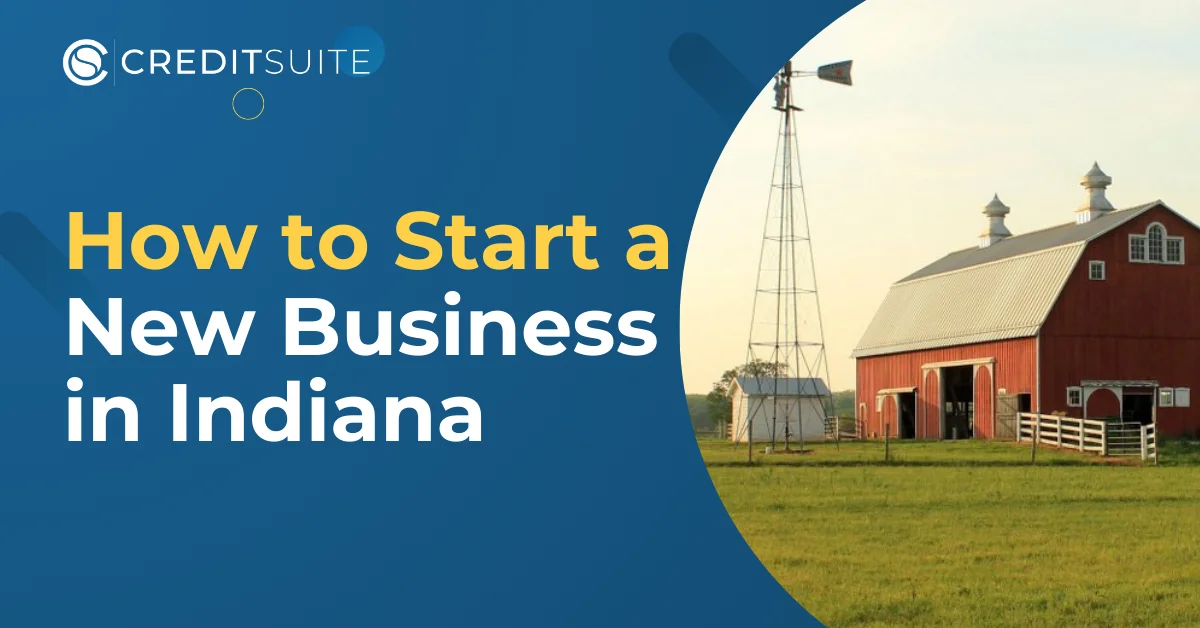Starting a Business in Indiana
A new business in Indiana can be yours. Have you been wondering: just how do I start a business in Indiana? And more importantly, can I do so no matter what the economic conditions are? Can I start a new business in Indiana during a recession?
New Business in Indiana: Pros and Cons
Business Insider puts Indiana in its middle ten states when it comes to starting a new business, per a 2016 article. And this is for the entire country. The state has the fourth lowest rate of new entrepreneurs. But it also has the second lowest cost of living.
Indiana has a ranking near the top for key economic indicators. These include business tax climate, the small business survival index, and several indicators relating to trade exports.
Recent Dramatic Upswing
In 2018, both Forbes and Fit Small Business placed Indiana at number eleven. Keep in mind, of course, that all three lists were created with differing methodologies.
Why the change?
At Forbes, Indiana is beloved for its regulatory environment (third best in the nation) and its quality of life. Whereas over at Fit Small Business, they like Indiana’s taxes, cost of living, and access to capital. However, Fit Small Business gives Indiana a lower ranking for quality of life, so take some of these rankings with a grain of salt.
Which is right? It will pay to do some investigating of your own. This is particularly when it comes to quality of life, which can sometimes be a tad subjective.
Start a New Business in Indiana – Indiana Top Industries
Life sciences, apparel and textiles and metal manufacturing are all strong sectors and industries in Indiana. However, the state is deliberately working to invest in and develop its high tech sector and diversify its economy. This is via several programs and funds.
The most noteworthy is its 21st Century Research and Technology Fund. The state is also putting much energy into specifically supporting small businesses through programs related to the 21 Fund.
New Business in Indiana: Opportunities
Smart business owners can take advantage of the bigger industries in the area by offering goods or services such as trucking for any industry. They can also offer inventions and manufacturing of scientific equipment. Other options are chemical manufacturing or designing fashion and fashion accessories. Another option is metallurgy, among others. Yet another option may be to center business concerns around the annual Indy 500 race.
Here is exactly how to start a new business in Indiana.
Start a New Business in Indiana – Indiana New Business Secretary of State Requirements
Register a Business Name
Any business owner can register a new business in Indiana at the Department of Revenue website.
An Indiana corporate business name must be unique. A business owner should search online records and databases to find out if the name that they have chosen is in already use by another corporation.
Go to the official website of the Secretary of State to search a database of Indiana businesses.
A business owner may decide to reserve a specific corporate name that they want until the time that they are able to incorporate. A business owner can apply online to reserve a corporate name at Reserve an Indiana Corporation Name on the official Indiana government website. It costs $10.00 to reserve a corporate name online. The reservation then will be effective for a period of 120 days.
The owner(s) of a corporation should decide on a registered agent for their corporation. The registered agent for a corporation will act as an agent for service of process. They will also receive legal and tax documents for the corporation. There are various corporate service companies that provide registered agent services for a fee.
When a business owner is deciding on a registered agent for the corporation, they might consider using one of the older corporate services companies.
Business Permits and Licenses
The Indiana Professional License Agency provides a list of professions requiring licenses.
Local Permits and Licenses
County (but not city) clerk listings are at the Illinois Association of County Clerks and Recorders.
https://creditsuite.wistia.com/medias/1rpvzn0f8n?embedType=async&videoFoam=true&videoWidth=640
Start a New Business in Indiana – Business Registration
A breakdown of steps and the required forms are in the entrepreneur’s starter guide on the Indiana Secretary of State website.
Tax Registration
Go to the Business Tax page on the state Department of Revenue website.
And go here for more on the steps to start a business in Indiana.
Virtual Offices
Alliance Virtual Offices offers Indiana virtual business office space in Carmel, Fishers, Indianapolis, and Valparaiso.
For South Bend virtual business office space, use Regus.
In addition, DaVinci has Indiana virtual business offices in the abovementioned locations, except for South Bend. For other areas of the state, business owners might want to ask local business owners. Or they might try even computer user groups to find help in this area. Other options might include looking for virtual business office space in neighboring states. These are Illinois, Kentucky, Michigan, and Ohio.
Start a New Business in Indiana – Build Business Credit
Small business credit is credit in a company’s name. It doesn’t tie to a business owner’s personal credit, not even when the owner is a sole proprietor and the sole employee of the business.
Therefore, an entrepreneur’s business and consumer credit scores can be very different.
The Advantages
Considering that small business credit is independent from personal, it helps to safeguard a small business owner’s personal assets, in case of litigation or business bankruptcy.
Also, with two separate credit scores, a business owner can get two separate cards from the same vendor. This effectively doubles purchasing power.
Another advantage is that even startup businesses can do this. Visiting a bank for a business loan can be a recipe for disappointment. But building business credit, when done the right way, is a plan for success.
Consumer credit scores are dependent on payments but also various other elements like credit utilization percentages.
But for business credit, the scores actually just depend on whether a business pays its bills on a timely basis.
Start a New Business in Indiana – Business Fundability™
A business has to be Fundable to lenders and merchants.
Hence, a small business will need a professional-looking web site and e-mail address. And it needs to purchase site hosting bought from a hosting vendor.
Also, company phone numbers should have a listing on ListYourself.net.
Also, the company telephone number should be toll-free (800 exchange or comparable). A small business will also need a bank account devoted solely to it, and it has to have every one of the licenses essential for operation.
Start a New Business in Indiana – Dealing with the IRS
Visit the Internal Revenue Service web site and get an EIN for the company. They’re free. Select a business entity like corporation, LLC, etc.
A business can start off as a sole proprietor. But they should change to a form of corporation or an LLC. This is in order to reduce risk. And it will maximize tax benefits.
A business entity will matter when it concerns taxes and liability in the event of a lawsuit. A sole proprietorship means the business owner is it when it comes to liability and taxes. No one else is responsible.
Setting off the Business Credit Reporting Process
Begin at the D&B website and get a free D-U-N-S number. A D-U-N-S number is how D&B gets a small business in their system, to produce a PAYDEX score. If there is no D-U-N-S number, then there is no record and no PAYDEX score.
Once in D&B’s system, search Equifax and Experian’s web sites for the business. You can do this at www.creditsuite.com/reports. If there is a record with them, check it for correctness and completeness. If there are no records with them, go to the next step in the process.
In this manner, Experian and Equifax will have activity to report on.
Vendor Credit
First you must build trade lines that report. This is also called vendor credit. Then you’ll have an established credit profile, and you’ll get a business credit score.
 And with an established business credit profile and score you can start to get more credit.
And with an established business credit profile and score you can start to get more credit.
These types of accounts tend to be for the things bought all the time, like marketing materials, ink and toner, and office furniture.
But first of all, what is trade credit? These trade lines are credit issuers who will give you initial credit when you have none now. Terms are often Net 30, versus revolving.
Hence, if you get an approval for $1,000 in vendor credit and use all of it, you must pay that money back in a set term, such as within 30 days on a Net 30 account.
You want 3 of these to move onto more credit.
A Monitor Your Business Credit
Know what is happening with your credit. Make certain it is being reported and deal with any mistakes ASAP. Get in the practice of taking a look at credit reports. Dig into the specifics, not just the scores.
We can help you monitor business credit at Experian, Equifax, and D&B for 90% less.
Update Your Information
Update the info if there are mistakes or the info is incomplete.
Fix Your Business Credit
So, what’s all this monitoring for? It’s to contest any mistakes in your records. Mistakes in your credit report(s) can be fixed. And fixing credit report errors means you specifically detail any charges you challenge.
A Word about Building Business Credit
Always use credit responsibly! Never borrow more than what you can pay off. Monitor balances and deadlines for payments. Paying on time and completely will do more to increase business credit scores than pretty much anything else.
Establishing company credit pays. Excellent business credit scores help a company get loans. Your lender knows the small business can pay its debts. They know the small business is for real.
The business’s EIN connects to high scores and lenders won’t feel the need to request a personal guarantee.
Business credit is an asset which can help your business for years to come.
Learn more here and get started toward opening a new business in Indiana.
Want to start a new business someplace else in America? Then check out our handy guide to starting a business in any state in the country.
Indiana’s Response to COVID-19
This is what Indiana is doing to address COVID-19. On March 16, Governor Eric Holcomb announced restaurants, bars, and nightclubs would have to close. Unemployment claimants can do everything online and are not required to be there in person.
The SBA issued a disaster declaration for Indiana, offering financial assistance for Hoosier small businesses impacted by COVID-19. Small businesses, small agricultural cooperatives, and nonprofits across the state are eligible. So they can apply for low-interest loans up to $2 million. This is to help overcome the temporary loss of revenue due to COVID-19.
Business owners can use these loans to pay fixed debts, payroll, accounts payable and other bills. Loan interest rates for small businesses and nonprofits are 3.75% and 2.75%, respectively, with terms up to 30 years.
On April 6, the Commissioner of Indiana Department of Workforce Development Fred Payne explained how Hoosiers will receive CARES act benefits.

